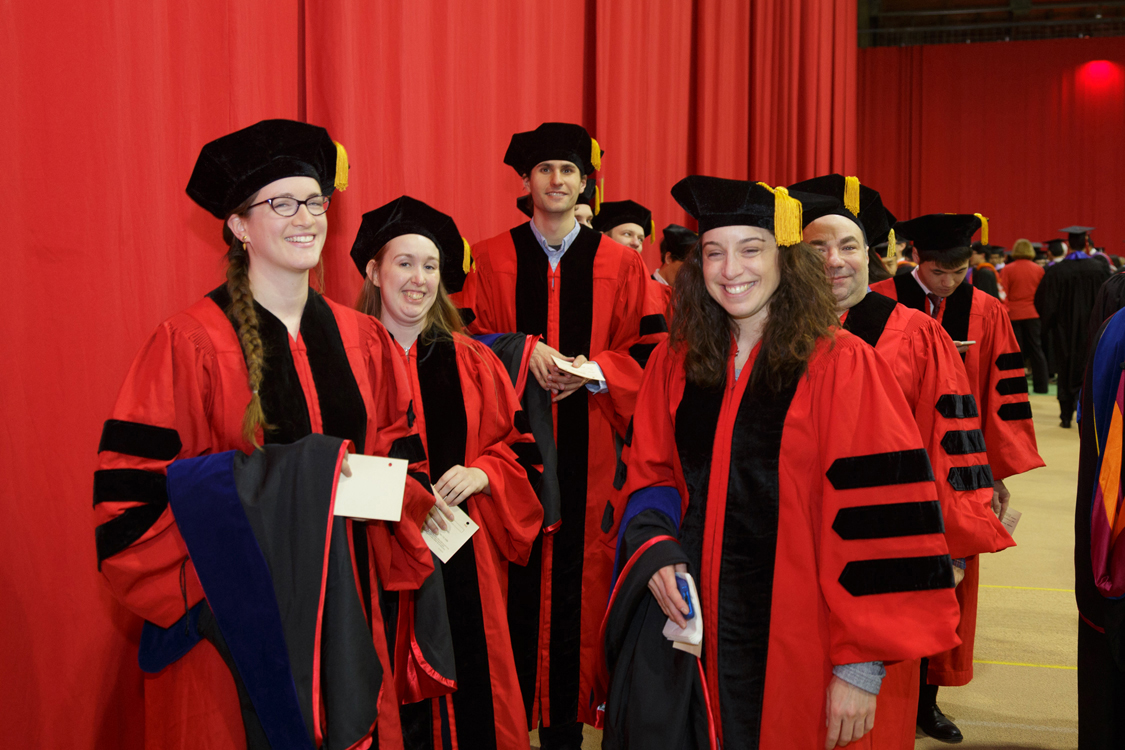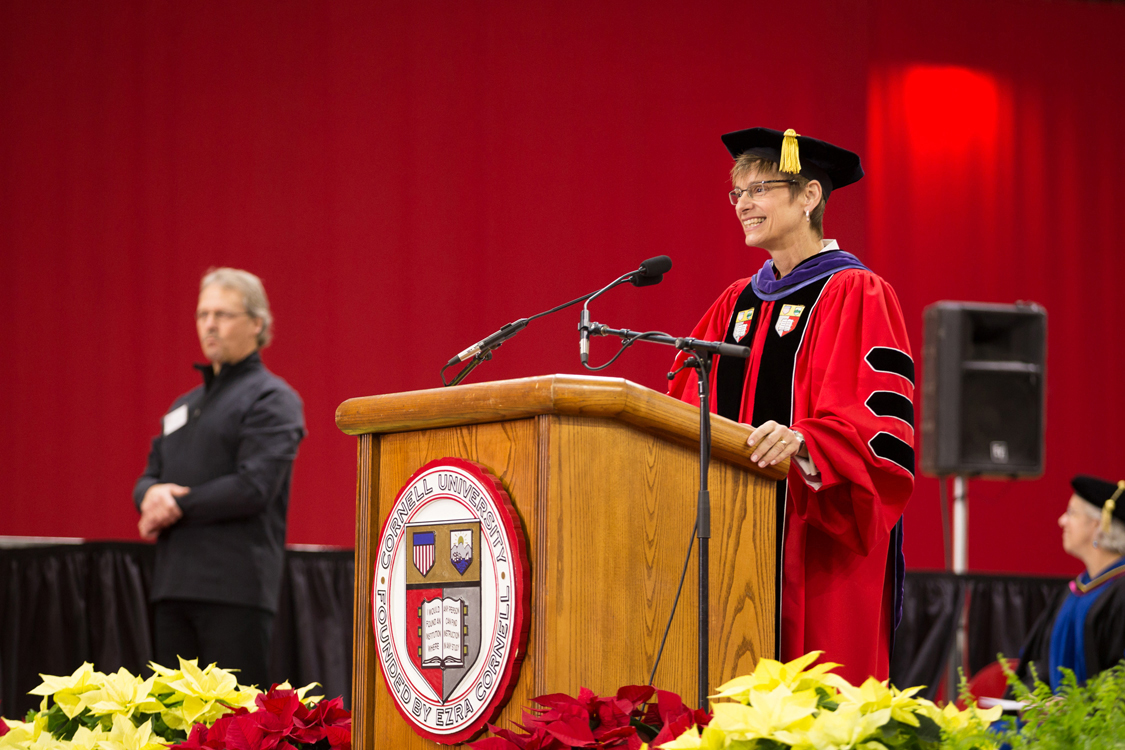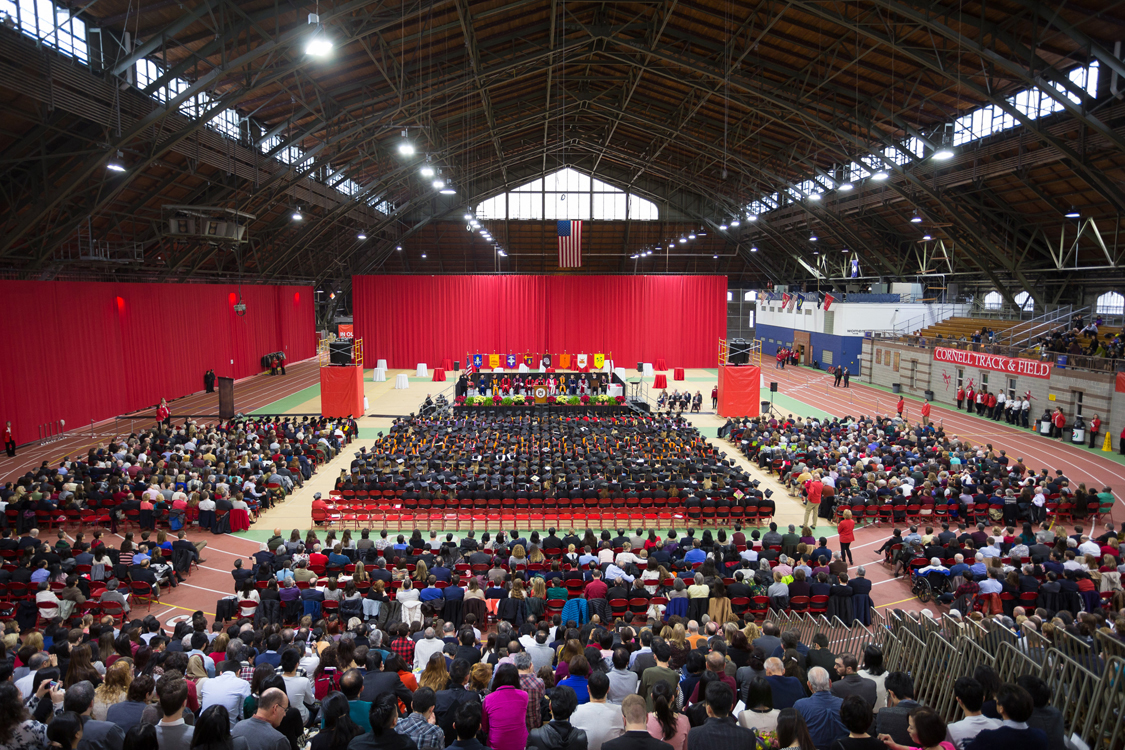December graduation features record number of participants
By Tom Fleischman



Stacy Carling was the first of more than 400 degree candidates to cross the stage and shake the hand of Cornell President Elizabeth Garrett at the 13th January graduation recognition event at Barton Hall Dec. 19.
Things haven’t always happened so quickly for the 38-year-old mother of two.
“I was very close to finishing and we moved away,” Carling said, referring to her husband, Matt. The couple arrived at Cornell in 2008, when Matt began his post-doctoral work at the Cornell Lab of Ornithology. A job at the University of Wyoming took the couple west in 2011, and Stacy’s education was put on hold.
“I thought I would finish within six months, and it took four more years,” she said, while holding her 1½-year-old son, Drew. “We had a couple of kids, and they became my absolute priority.”
The ceremony paid tribute to the 964 degree candidates, while not actually conferring degrees. That happens in January. A total of 444 candidates took part in Saturday's event, the most in the 13-year history of the recognition ceremony.
More than 500 of the candidates will earn their bachelor’s, with 435 in line for master’s degrees and another 25 – including Carling – earning their doctorates.
Garrett, who was taking part in her first Cornell graduation exercise, made mention of the fact that in addition to the graduates who’ve completed the familiar four-year trek to a degree, there were others for whom degrees came at the end of a more winding road.
“You are at many different points in your lives,” Garrett said. “While most of you will receive a bachelor’s degree today, others will be celebrating the completion of a graduate or professional degree, perhaps having returned to the academy after a period of work or life experience.”
Those last few words hit home with Carling.
“I can definitely relate to that,” she said, adding that the seven years that have passed between her arrival at Cornell and earning her degree were invaluable.
“I’ve often thought about if I wished I had finished before I had the kids, and I’m actually very happy I didn’t because I think they’ve actually given me so much more perspective on life,” she said. “I am enjoying this day so much more because I have my kids and my whole family here. I wouldn’t have it any other way.”
Carling was joined by several family members, including husband Matt – an assistant professor of zoology and physiology at Wyoming – and their 3½ year-old daughter, Sevita. Stacy, who earned her doctorate in nutrition sciences, works at the University of Wyoming Department of Kinesiology and Health, helping run a program that addresses childhood obesity.
In her remarks, Garrett urged the degree candidates to embrace an “intellectual life,” quoting late Cornell professor Carl Becker in noting that it is a life “about questions more than answers.”
“It is, he said, ‘a continuous adventure of the mind, in which something is being discovered, possessing whatever meaning the adventurer can find in it,’” she said.
Garrett also urged the gathering to embrace ignorance, borrowing from Columbia University’s Stuart Firestein, who wrote “Ignorance: How It Drives Science” in 2012.
“Ignorance in this sense, he says, is ‘not an individual lack of information, but a communal gap in knowledge,’” she said. “’It is a case where data don’t exist, or more commonly, where existing data don’t make sense, don’t add up to a coherent explanation.’ This is the kind of ignorance that exhilarates the scholar.”
Jonathan Lowry, senior class president, followed Garrett at the lectern and told a story of an intrepid young girl (“Cornellia”) whose tale was a lesson in sharing the lessons learned in the classroom. Cornellia came upon two doors, and behind one found a glittering banquet hall with a long table filled with delicious food and drink, but the diners – who all had spoons with long handles that made eating with them impossible – bickered and quarreled.
She was just about to leave when she heard “a tinkle of laughter” from behind the other door, and opened it. There she found a similar table, with one marked difference.
“These diners, too, had long spoons, but rather than trying to feed themselves, they reached across the table with the spoons, to feed one another,” he said. “Our education, these tools we’ve received, these long spoons we hold in our hands, can separate us from others, or they can bring us together.”
Lowry closed by urging the degree candidates to use their educations to make a difference.
“Wherever we may go, I trust we will be a force for one another,” he said. “To take what we have done and learned on this campus, to the outside world so that we may nourish those around us as opposed to just ourselves.”
Media Contact
Get Cornell news delivered right to your inbox.
Subscribe